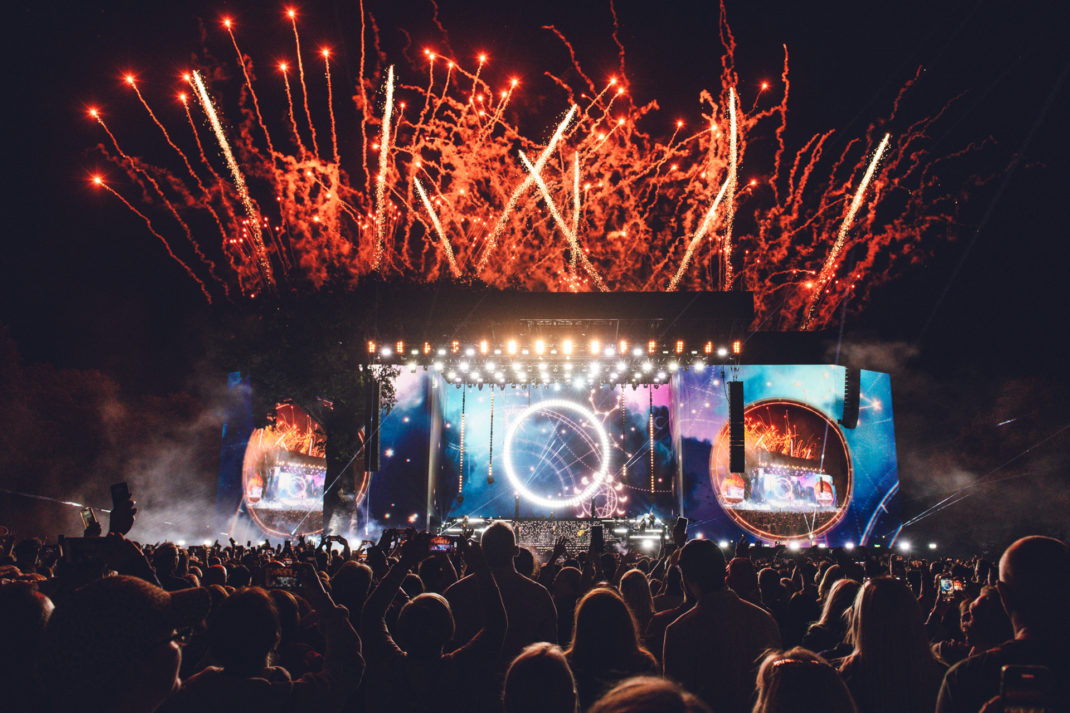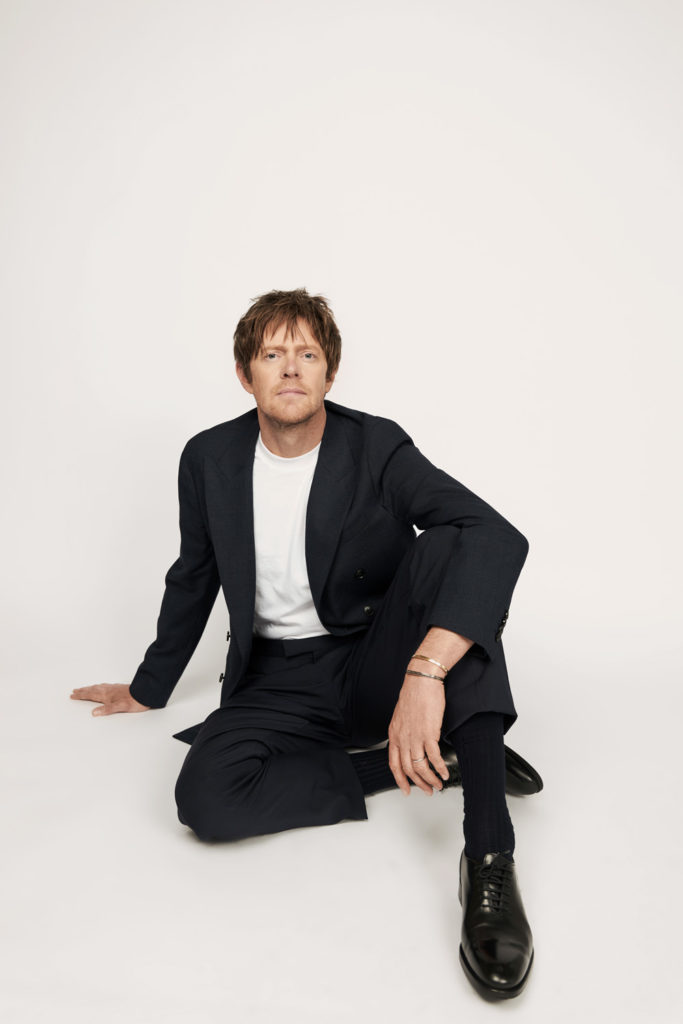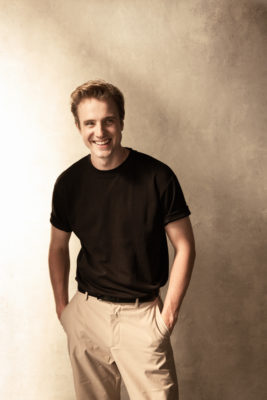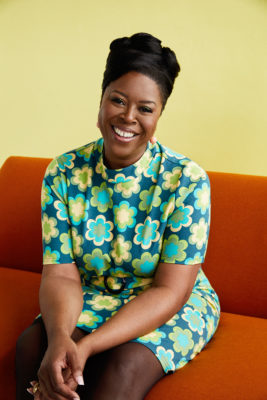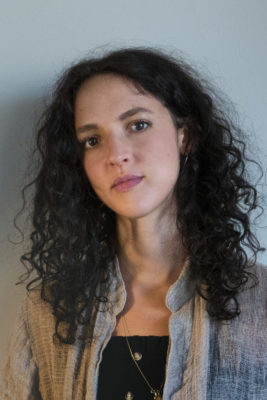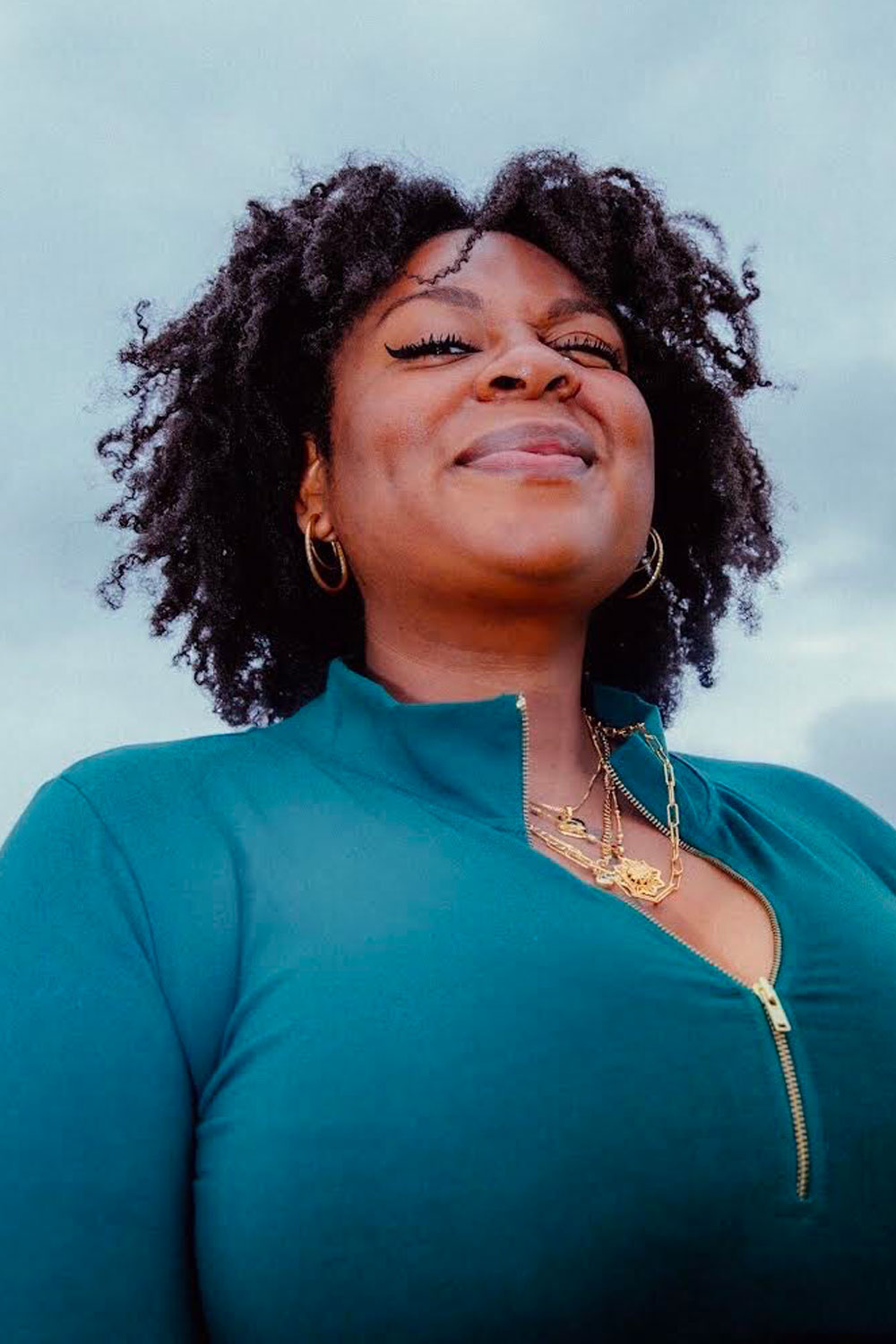
Candice Carty-Williams Wants You To Know That She’s NOT Queenie, Thank You Very Much
By
9 months ago
The author on putting Queenie to rest and taking a good break
Candice Carty-Williams wrote Queenie in her early 20s. And it’s been a whirlwind since then. Now 34, she says she’s ready for a breather – if the screenplays let her. She talks to us about writing magazines in her teens, loving Michaela Coel, and why watching the world is her favourite way to research.
Interview: Candice Carty-Williams
You’re often on the other side of these interviews, as the journalist – is it weird being this side of it?
I haven’t done any for a while – I quite miss it. You get to know someone really well, don’t you? In a weird, concentrated way.
Yeah, you get a snapshot into their life in that one moment. Talking of, though, how are you? What’s keeping you away from doing interviews – all the screenwriting?
It’s been all the screenwriting. I started out in journalism. I’d decided to do it because I liked meeting people, talking to people, and culture. And then I went into publishing, because I love books so much. And then, as I was working in publishing, I wrote Queenie. And that meant there wasn’t a lot of time for anything creative outside of that. Then I was approached by a production company to write Champion and then I was doing Queenie’s TV adaptation alongside it. And I’ve been trapped in a screenwriting document for the last seven or eight years.
Goodness me, that’s a lot of time spent on dialogue.
Yes, it is.
Do you still love it? Screenwriting?
I do. I really do. It has to be the right project, and anything that I take on now, it will be something you’ll know that I absolutely love. But it takes up so much of your life – night and day – that it has to be something that you really love. You can’t just do it for the sake of doing it, you know?
I wondered if we could then go back a little bit in time. I want to hear a bit more about you. Grew up in South London, your parents, you’ve said in previous interviews, weren’t readers. Did you always know you wanted to be a writer?
Funnily enough, I found a load of my schoolbooks the other day, and I apparently had completely forgotten that I used to make little magazines. I would draw covers, and then the contents? And I’d ask, what’s culturally going on? It featured the bands that I liked, the pop stars I was really into, and the TV shows I was watching. So I think I was always going to be creative, even if I didn’t remember that. Writing a novel and then writing for the screen, though I wouldn’t say it was an accident, but it definitely wasn’t a plan.
Tell me about this magazine: who were the bands, what were the TV shows?
Oh my god – like, Garth Marenghi’s Darkplace, Fresh Prince of Bel Air, Buffy: The Vampire Slayer… So Solid Crew. Britney Spears, Christina Aguilera. I was in year seven. I was capturing the popular culture of whatever year it was in which I was 11 years old.
That really timestamps it.
For sure. It was really nice then that the first song you hear in Champion is a So Sonic Crew One. But I hadn’t put it together when we chose that.

Malcolm Kamulete in Champion. © BBC
Talking of Champion. I remember interviewing Malcolm [Kamulete] a few months ago and he absolutely sung your praises. What strikes me about your projects is that everyone involved feels the same kind of passion as you do. How do you tend to find your creatives for these projects?
So I would say that I tend to write characters and then they live in my head for a long time. I’ll meet person after person [in the casting room], and then ‘the’ person will walk in and I’ll be like: ‘there we go’. For Champion, we had someone we thought was Bosco, it was kind of set. And then, a producer who’d work with Macolm said – you need to watch this tape. I immediately was like, no, why – and he said: ‘well, because it’s Malcolm Kamulete from Top Boy’. Within ten seconds, it was just obvious that that was Bosco.
I feel like I will always have a sense of who someone is going to be. I’m happy to be persuaded otherwise, but I usually have quite a good punch.
Talk to me a bit about adapting your work – what was it like being in a writer’s room for Queenie? Did you feel protective of it?
I’d been writing episodes – or outlines for episodes – for Queenie for a long time. Because I was also working on Champion, they brought in the writer’s room to lighten the load and add in different perspectives. It was great to strength test my ideas, and find new things that would make us laugh.
We had an all-female writer’s room except for Ryan Calais Cameron, who’d written [the play] For Black Boys Who Consider Suicide, and it was nice to have a man in the room [with us] – he’d throw something crazy into the middle and then we’d all work to deconstruct it.
It was really nice just having ideas around the same things with a set of people who you realise knew exactly what you were trying to say.
Can you tell me a bit about your writing process when you’re working solo?
My writing process – when I write novels – is to start and just keep on going. Whatever happens, however you feel, putting one word in front of another. If, one day, I write 15,000 words, great, if another I sit down and like 500 words come, great. There are definitely days that I’ve just got nothing in the chamber, so I step away, take a break and look at something, read something, watch something.
I don’t read any fiction while I’m writing fiction. And when I’m not writing, I spend time observing and listening to people, seeing how they communicate, even non verbally. The world [tends to be] my research. Obviously, if I need to do research, I will do research. But I love to see how people are – I see my characters as real people.
With TV, it’s a bit different. You’re working with different executives, people who’ve paid for it, and they want to see what they want to see as well. So there’s more conversations, more persuasion – but I’m good at that, so it’s fine. You don’t really have a break with TV [either], so [novels and TV] are very different in terms of what you need to give. Novels, you give what you’ve got; TV will take everything from you.
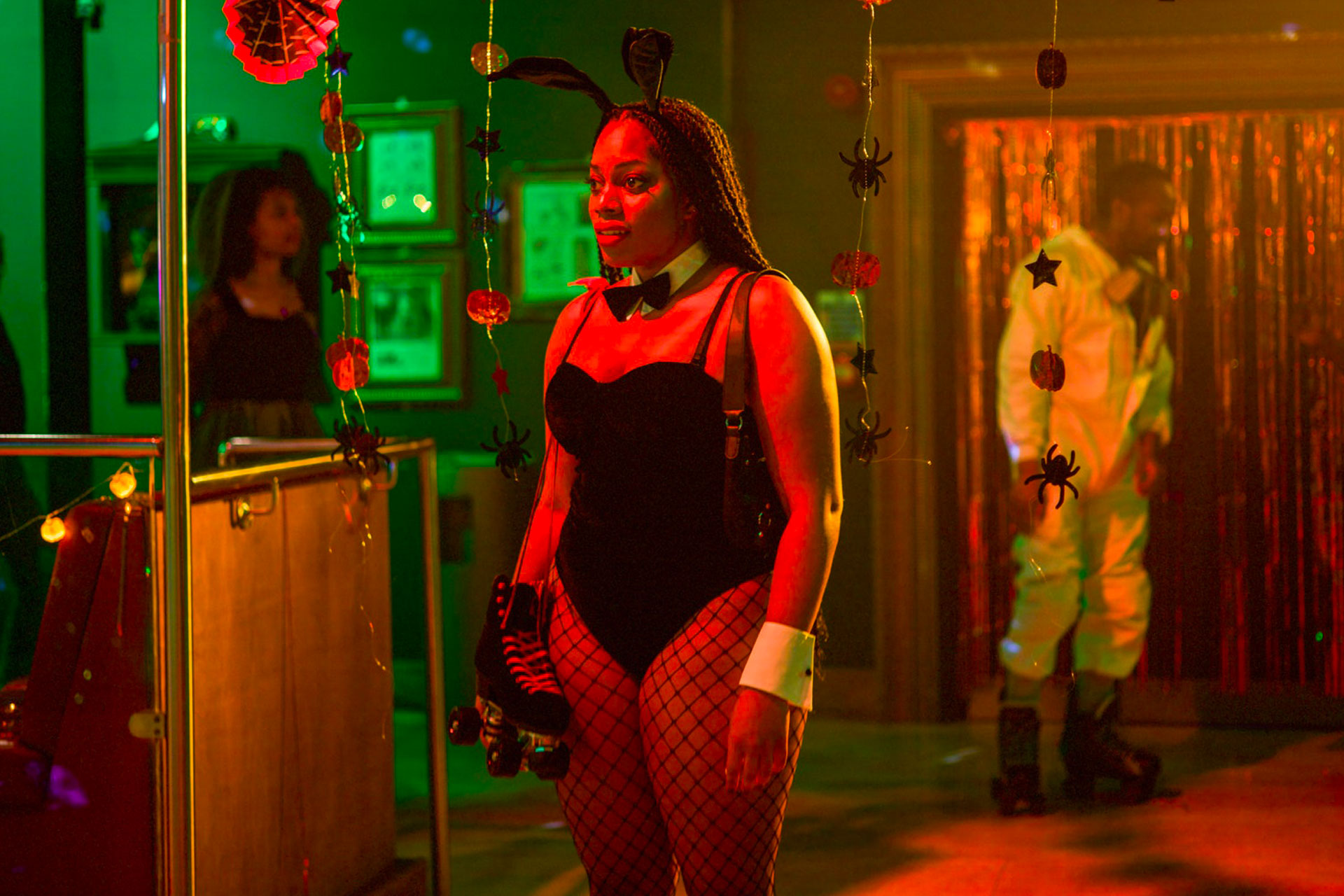
© Channel 4
I wondered how you must be feeling now, a few weeks after Queenie has come out with TV – how are you feeling now that the dust has settled, people have watched it – do you feel like you’ve put your baby out there?
You know what? One of the things I’ve been able to do [well] in my life is separate myself [from my work]. I have always had to separate myself from Queenie from the beginning because everyone would assume, you know, that you’ve written about this young black woman, so therefore you must be her. I don’t imagine Phoebe Waller-Bridge gets asked if she’s fleabag! Because obviously that is a woman doing hilarious, but, like, morally deplorable things. That’s the point.
This novel and me, they’re different things. So now the show is done, I’m kind of like, there we go. I’ve worked on it for eight years. Like it? Great. If you don’t? Great. It’s done. Queenie is out, and now The Bear’s new series is out – everything has its own little moment. As soon as we’re done chatting, I’m watching the new Bear. I’m super excited.
But one thing that feels amazing is that I’ve had thousands of messages through comments and DMs – even people in the street – telling me they found the show healing, that it helped them feel or express things. I’m really glad that I could do that. Through my work, I want to connect to people, whether that elicits a positive or negative response.
I read one of the reviews of your work, and they said it made them feel better understood in a world in which they’re told to ‘act less black’. I wondered if you’re happy to talk to me about other shows you feel nail black experience – also, to be honest, I wondered if there’s a point where it gets boring being asked about black experience in relation to your work?
No, I think it’s really important. It would be a weird interview if you weren’t aware of the fact that I’m a black woman; I exist in the world as one. That’s how I am. You exist in it as a white woman, and we have different backgrounds and social structures, people approach us differently. I think it’s weirder to not want to say that or see that.
The Real McCoy was the sketch show that everyone in my family would watch and talk about. It’s full of people who are legends today, and a load of Jamaican actors. And then people like Meera Syal – different people of colour from other backgrounds – joining in. You’d hear all their accents, they’d talk about food, I remember thinking it was the funniest thing ever.
Llewella Gideon plays Grandma in Queenie and was on the show, and I grew up just knowing I had to work with her, it didn’t matter what I did.
Joseph Marcell plays Grandad and was obviously in the Fresh Prince of Bel Air as Jeffrey – he was always going to be Grandad, because he was part of this tapestry that I grew up watching, understanding.
But as you know, there’s still a dearth of representation of anyone who isn’t white. A lot of police procedurals [on TV], a lot of period dramas. So, it’s been interesting to contribute a few shows to the space.
Ooh – the other one for me is Chewing Gum. I’ve been rewatching it and laughing my head of; Michaela Coel was one of the first black women to be on screen and be visibly black. That was amazing and inspiring for me. The work she’s done is incredible and enduring.
Have you bumped into each other yet in the world of showbiz?
I don’t think we’ve been in the same room. It’s one of those weird things where in I May Destroy You, Arabella was a writer and I [so related]. Maybe one day we’ll be in the same room, and it will be weird. I’ll just wonder what to say.
A comedy collab would be cool.
I mean, comedy is just her thing. I like drama, with, like, a little bit of funny, but she gets comedy. I really, really rate her.
So, I wondered what’s coming next for you?
Basically, I need a break. I’ve written – in the past eight years – two novels, two books, two short stories. One advert for Prada. Two TV shows. I’m kind of going two for two on everything, and I’m 34 and want to be able to spend some time with family and friends. I hadn’t seen them for months when I came off set for Queenie. People were like, ‘who are you?’. Hi, I’m here.
I have got three things that I’m developing. I’m reluctant to start developing, because it means it will take over my life. I’m excited to maybe step into a new space…
I think that I will tell stories for as long as people let me. I’ve got a lot to tell. But yeah, having a real break is next. You have to look after yourself. If you want to keep telling stories, you need your head intact. I’m 34! I’ve got probably another 34 years of making stuff in me.
Quick-Fire
What’s bringing joy for you at this moment?
Sitting in my living room with the windows open and burning incense while listening to music – I’ve not been able to do that without having an email for years.
What advice would you give your 15 year old self?
Don’t let them tell you that you’re not smart.
The key to achieving a balanced life?
Being able to separate from your phone. If it’s urgent, someone will turn up at your house.
What does sustainability mean to you?
It means personal responsibility. Living a life where I am recycling, not wasting what I don’t need. Taking responsibility for my own actions, not worrying about [other] people on private jets.
What are you tuning into?
Rewatching Chewing Gum. But then, the new season of The Bear! I also really loved Fallout recently, and got on less well with The Boys – it’s very violent, isn’t it?
What are you reading at the minute?
I’m reading an [advanced reader copy] of a book called Neverland: The Pleasures and Perils of Fandom by Vanessa Kisuule, which is about her obsession with Michael Jackson. And how, as a fan, you navigate his allegations of child abuse.
Musician you’ve got on repeat?
Billie Eilish’s new album, some Frank Ocean, Brat by Charli XCX. And then, like, the Smiths. I’m a very broad listener.
Finally, your cultural guilty pleasure?
Oh, I don’t believe in guilty pleasures. Tessa, I like what I like. And I will stand up and I will say it with my chest.
You can watch Queenie on Channel 4, channel4.com

